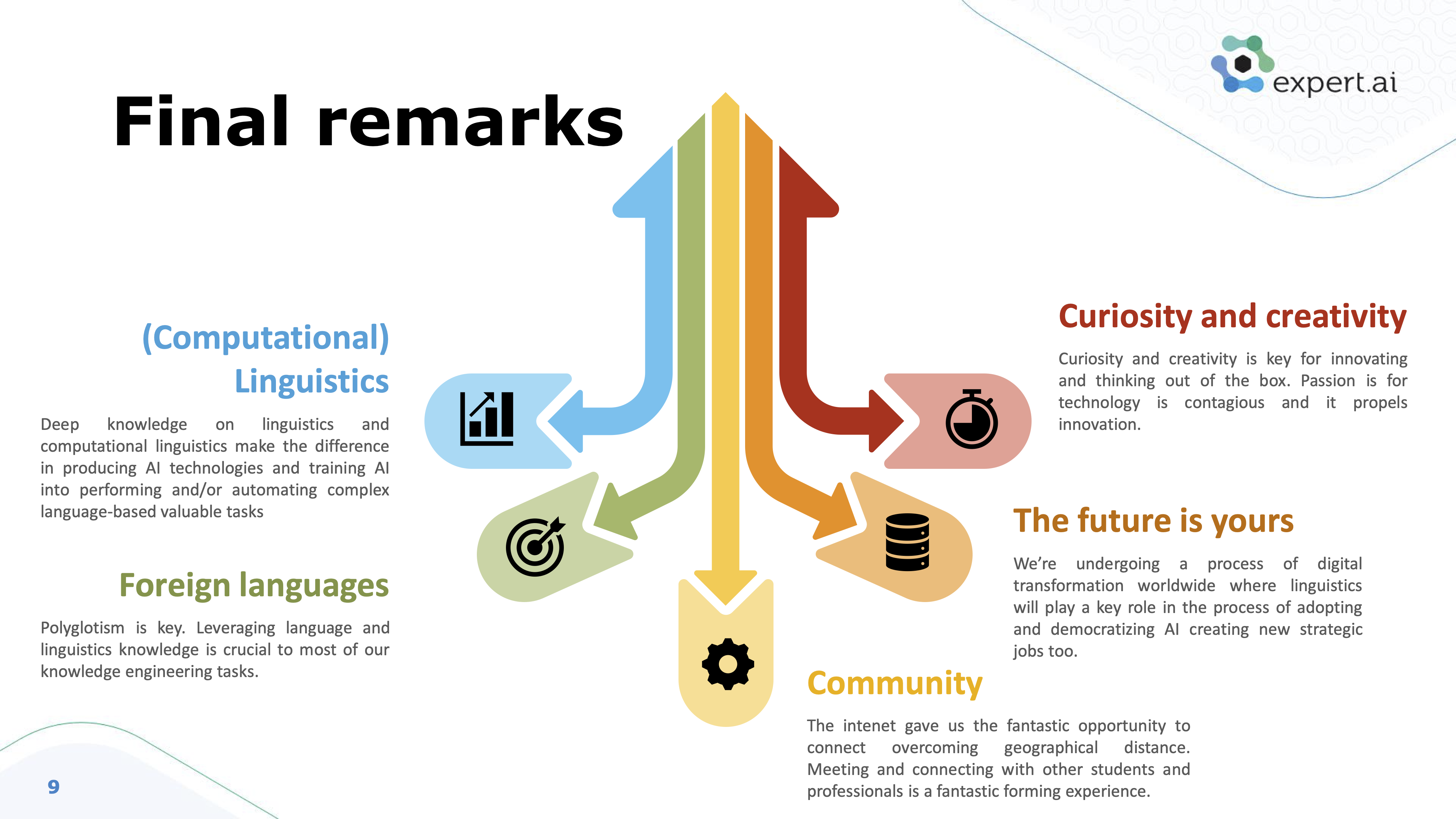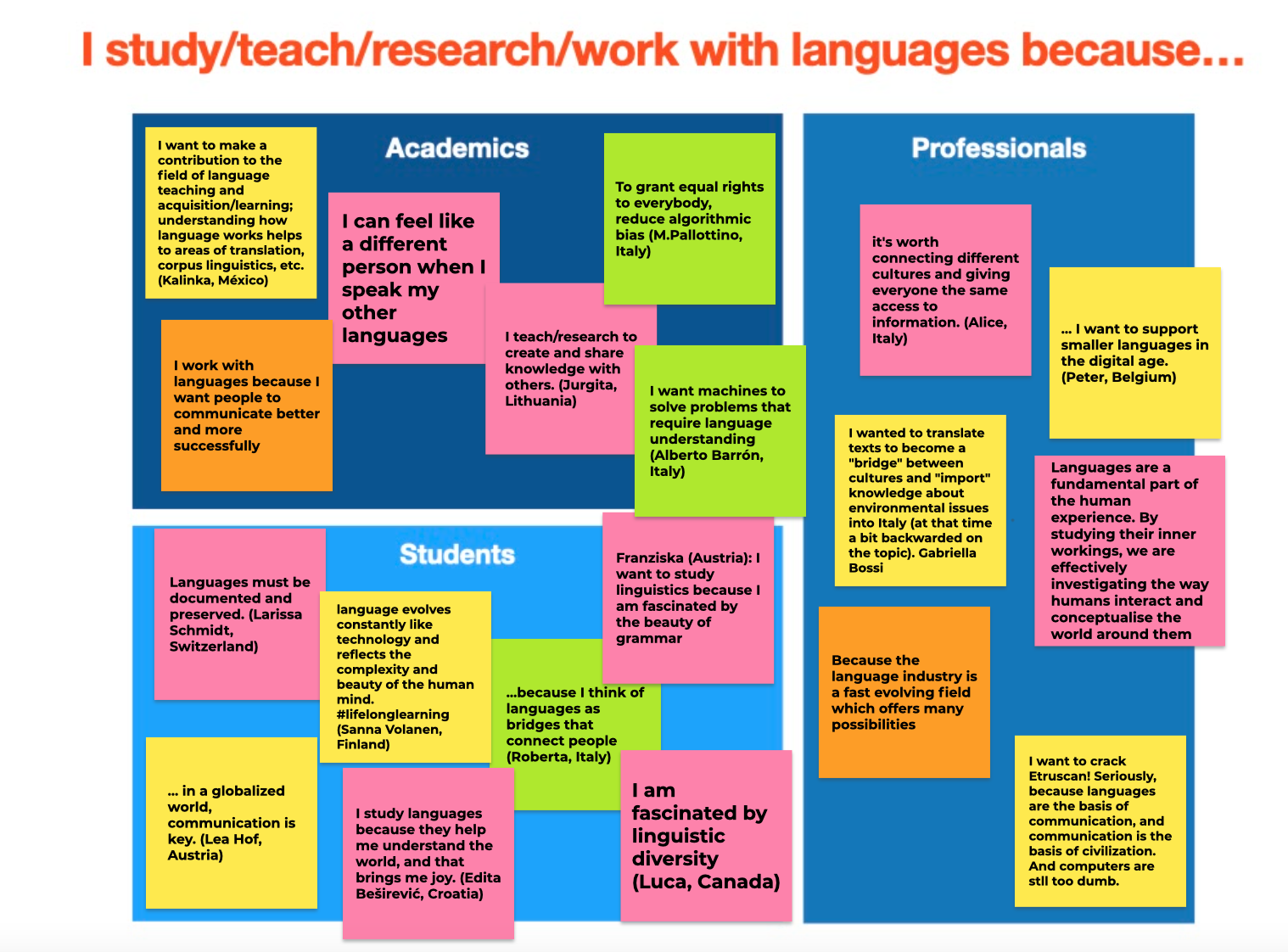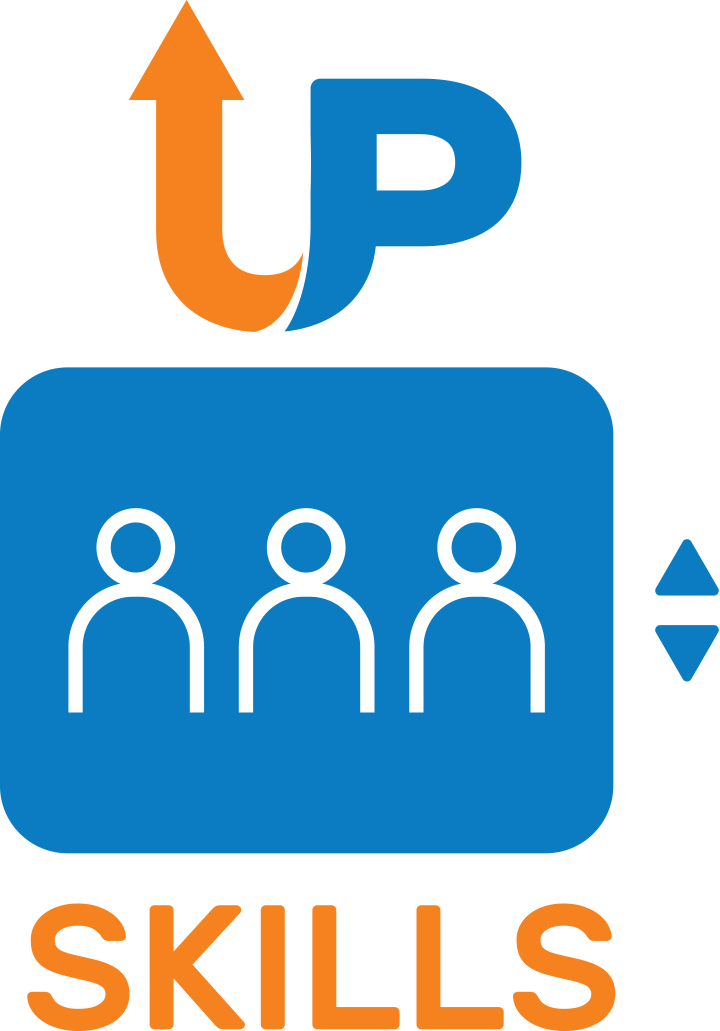Every time I hire a linguist…
An account of the 1st UPSKILLS multiplier event
In keeping with the spirit of UPSKILLS, the first multiplier event of the project was conceived not only as a way of disseminating results, but also as a concrete opportunity for university students – and lecturers – to meet and network with potential future employers. The sessions of the event were thus arranged so to share and discuss insights emerging from the project and its stakeholders, and to let participants interact. In what follows we present a brief account of the day, session by session. Where available, we include the slides displayed during the presentations as downloadable PDF files and links to video recordings.
In this post:
- A description of the day’s sessions
- Slides by presenters
- Links to video recordings
UPSKILLS IOI: Language, technology and the future of the language professions
In the first session, the members of UPSKILLS presented the needs analysis carried out during the first nine months of the project. The aim of the needs analysis was to explore the current academic offer in language- and linguistics-related fields (modern languages and cultures, translation, general linguistics, etc.) and the requirements of the job market for graduates in these areas.
Given the short time, presentations could only provide a gist of this ambitious and multifaceted research output. Those interested in the details can refer to the Deliverables page of this website, where links to the full reports are provided.
After an overview of the project, of its team, rationale and expected results, delivered by the coordinator Stavros Assimakopoulos, Jelena Gledić presented the survey of curricula. The survey encompassed programmes of more than 120 BA and MA degrees in language and linguistics from all over Europe. Results showed a general underrepresentation of the research, data acquisition and data handling skills that other components of the needs analysis identified as crucial in today’s language professions.
Recordings from the UPSKILLS IO1 session
Silvia Bernardini then went on with a presentation on the main insights emerging from industry surveys, institutional position papers and academic works on required skills and competences in the language sectors. The take-home message was that as Artificial Intelligence is driving more and more profound changes in the world of work, education should focus on skills and tasks that until a few years ago fell outside the realm of language and linguistics proper, or tended not to be explicitly taught. These include technology-related skills such as data management and digital marketing, but also higher-level competences like critical thinking, problem solving and creativity.
It was then Adriano Ferraresi’s turn, who introduced the second major component of the needs analysis, devoted to the market’s perspective. He presented an analysis of a corpus of nearly 200 job posts addressed to experts in language and linguistics, collected from specialised and non-specialised job platforms. The set of skills, competences and tasks identified in this phase pertain to 4 main areas: data and research, technologies, disciplinary knowledge and communication/organisational skills. The data gathered from the corpus made the basis for the subsequent two steps in the needs analysis.
In her second presentation of the day, Jelena Gledić reported on the results of an online questionnaire targeting 70 employers from digital and data-intensive sectors, who do not necessarily identify language and linguistics graduates as a talent pool of employees for their business. Among the skills that are deemed crucial and at the same time most in need of improvement according to the respondents, problem solving, technical skills and organizational skills feature prominently.
What seems to be lacking the most from existing language and linguistics curricula is specialised training that will enable graduates to think outside the box and come up with their own solutions to typical industry workflow problems.
In the last presentation devoted to company insights from the needs analysis, Michela Vella reported on the interviews carried out with 11 companies from various sectors, from language service providers and language technology services to the automotive and insurance industry. Like the previous components of the needs analysis, results show that there is a growing need for graduates in linguistics and language-related disciplines, even if existing curricula need to better prepare them for the goal-oriented character of industrial work.
Maja Miličević Petrović rounded off the session by introducing the new professional profile emerging from the UPSKILLS needs analysis, that of the language data and project specialist. The profile contains a description of knowledge, skills and competences that present-day and future graduates in languages and linguistics should possess in order to achieve better employability, and ultimately to meet the societal and professional challenges lying ahead. The profile is divided into 4 sub-profiles, each corresponding to different tasks that graduates can be expected to carry out as professionals and to different levels of seniority/responsibility within companies.

The UPSKILLS profile
Languages in the 21st century: Societal challenges and technological developments
The second session of the event was devoted to the perspective of the institutions, and featured a keynote address by Jörgen Gren, Director of Resources at the Directorate-General for Translation (DGT) of the European Commission.
Upskilling has always been relevant, but it’s even more now, as AI and AI-related technology have such an impact on society in general, and in our work in particular.
In his speech, he referred to the experience of DGT to illustrate the impact that AI has had on a “traditional” language-related profession like that of the translator at EU institutions. In 2021, the demand for translations at DGT has exceeded 100 million pages, and the figure only refers to the first six months of the year. Mr. Gren pointed out that the only way in which the institution is able to process such huge amounts of text is by relying on the EU Machine Translation (MT) system. This would not be sufficient, however: the human-in-loop remains a central factor for translation workflows to be successful, and both younger and more senior EU translators have taken on the challenge posed by MT, especially by updating their competences in the technological field.
The revolution brought about by AI, he continued, has not only led to changes in existing professions, but it has also created new opportunities, in the form of new positions. Among the diverse profiles at DGT open to language and linguistics graduates, he mentioned that of computational linguist, workflow designer, language technology coordinator, terminology specialist and data curator.
The talk concluded with a message of encouragement: provided that future graduates are ready to be embrace the change and get on “the digital train”, as Mr. Gren called it, they can look at the future with confidence.
Recording from Mr. Gren’s talk
Old jobs with new twists: Examples from industry and research
In the final session of the morning, representatives from private companies and research institutions were invited to provide examples of language- and linguistics-related professions which require a combination of technological, analytical and problem solving skills. All speakers also provided examples of the typical tasks that graduates can expect to carry out in these positions.
Presentation slides
Nikola Ljubešić, from Jožef Stefan Institute (Ljubljana), illustrated tasks revolving around various AI-based systems, including systems for part-of-speech tagging, Machine Translation, and hate speech detection. For most modern implementations of these systems to work effectively, human input is required at several stages. Mr. Ljubešić mentioned three tasks in particular for which “properly trained linguists” – as the title of his presentation goes – are needed. They can be asked to annotate the input data which are fed into the systems, to perform analyses of the errors in the output, or to build benchmarks against which the performance of AI can be compared. What are then the skills of a linguist properly trained for these tasks? According to Mr. Ljubešić, a strong theoretical background in linguistics and great flexibility in adjusting to different theorical frameworks, the ability to strictly follow annotation guidelines, and a good understanding of how AI works.

Skills and competences required at expert.ai
Lorenzo Musetti, from expert.ai, also focused on the role of linguists in developing AI technologies, especially in the field of Natural Language Understanding. The company regularly hires linguists both with and without a computational background, employing them in three main teams. Within the Research and Development team, linguists occupy positions as knowledge engineers who are in charge of creating knowledge graphs, annotating data, doing (some) programming and publishing articles on the team’s work. In the Professional Services team, linguists are mainly involved in project management, and liaise with technical teams in order to deliver customised solutions for customers. Finally, employees in the Academy team are responsible for all training and dissemination activities, where excellent public speaking skills are a must. In summing up the competences that a good job candidate should possess, Mr. Musetti highlighted knowledge of (computational) linguistics, of at least one foreign language and, importantly, curiosity and creativity.
Alice Cipressi presented then the perspective of Acolad, a large company in the language services industry. Most of its staff is composed of linguists, often with a background in translation, and this also applies to teams that are not strictly involved with linguistic tasks, like desktop publishing or quality assurance. The role of project manager was mentioned as one of the most requested ones: in this position, linguists/translators coordinate all actors involved in the translation process, from receiving requests to delivering the final product. For these tasks, excellent communication and problem solving skills are essential, but technical skills related to Computer-Assisted Translation (CAT) technologies are also seen as a very welcome plus. On the more technical side, Ms. Cipressi mentioned the profession of Machine Translation specialist, a role that has only recently been introduced in the company. The MT specialist has an all-round view of whether and how MT should be integrated in translation workflows: for example, they carry out feasibility studies, and create and test customised MT systems.
The final talk of the session was by Ilire Hasani-Mavriqi, from Graz University of Technology and Know-Center, who presented the profession of data steward. This is a very recent job profile introduced in Austrian Universities, whose main role to is to support data-driven research by playing an advisory role throughout the data lifecycle. Data stewards thus manage data and data infrastructures from the initial phases of research projects to data preparation, data archiving and reuse. Even though the profile does not target linguists specifically – and in fact the data managed by data stewards may come from all fields of research – this is a job where the communication and technical skills acquired by linguists are greatly valued.
Recordings from the Old jobs with new twists session
Studying language with science and technology: A wish list from two Erasmus Mundus masters
After the lunch break, the event resumed with a session devoted to the perspectives of university lecturers and students. While the previous two sessions involved stakeholders from institutions, industry and research, and were focused on the skills that graduates in language and linguistics should possess in order to enter the job market successfully, in the first session of the afternoon we took a step back, and discussed linguists’ education from the point of view of those most directly involved in it. In particular, we asked lecturers from two Erasmus Mundus masters to share their views on the key factors behind students’ academic success, and we asked their students what they perceived as the most challenging aspects of their education path. The Masters were selected among those at the crossroads between linguistics and technology, and which have a strong research-related component.
Presentation slides
What I was missing in my BA education was even knowing that there was a computational way of doing things.
Ivana Kruijff-Korbayová introduced the European Masters in Language & Communication Technologies (LCT). The Masters focuses on NLP at large, and welcomes students both with a computer science background, and from language and linguistics, including theoretical linguistics, philology, translation and literary studies. After a brief presentation of the contents of the Masters, Ms. Kruijff-Korbayová discussed some of the areas where students tend to experience most difficulties, especially at the beginning of their studies. In particular, she mentioned mathematics and statistics, Python programming, machine learning and data structures. But most of all, she encouraged students to embrace the kind of “practical approach”, as she called it, that will let them deal with complex issues. Instead of expecting to learn how to do things properly, and then apply what they have learnt, she encouraged students to always try, and not be scared of making mistakes.
Gaetana Ruggiero then presented the point of view of an LCT student with a purely linguistics background. Her message was that it would be important for linguistics degrees to introduce computational concepts from the BA level, as this would broaden the students’ horizons and open up new opportunities for them.
The Masters in Technology for Translation and Interpreting (TTI) was presented by Sara Može. Its main aim is that of educating future developers of translation and interpreting technologies, and, in view of its strong research focus, making a solid springboard for PhD studies. The ideal applicant for this Masters has a BA in translation/interpreting, computer science or computational linguistics, is fully proficient in English, and knows at least another language. As for the desirables, they should have some experience as professionals or in research, and demonstrate strong IT skills with CAT tools or programming.
The TTI student Marina Tonkopeeva confirmed that IT skills are crucial in the Masters, but that soft skills and some knowledge of entrepreneurship definitely help in advancing one’s career both as a student and as soon-to-be professional.
Recordings from the Studying language with science and technology session
Students meet industry, meet academia: Interactive networking session(s)
With nearly 350 messages posted in the group chat, interactions between the audience and speakers were intense throughout the day. The last session, however, was designed specifically to let all participants express their point of view. After a Q&A session in which the morning’s and afternoon’s speakers answered questions in the plenary session, the audience was split into smaller groups, and each was assigned to a Zoom’s breakout room to facilitate discussion.
We laughed at a meme about a linguist’s job hunt and asked for the audience’s opinion on the job profile and subprofiles that were produced by UPKSKILLS, and discussed one of the recurrent themes that emerged during the day, including whether linguists will still be part of the picture in the future of the language industry.
In closing, we asked everybody to write their reason for studying, teaching, researching or working with languages. Below are some of the most insightful and inspiring answers from the participants.
— carina (adult human sbemail 💌) (@checarina) May 18, 2021
The meme used to introduce the networking sessions
The jamboard resulting from participants’ discussion

Concluding remarks
Many points of view were expressed during the day, but everybody agreed on a central point. AI and language technologies in general are taking giant steps forward every day, but they should not be seen as a threat by graduates in language and linguistics. In fact, they are creating new opportunities, and the need for linguists in the language industry is likely to stay the same – or even increase – in the foreseeable future.
It will take some effort from all parties involved: more connections will have to be established between industry and universities, and both university degrees and their students will need to be ready to adjust and take on the challenges of this incredibly rapid technological evolution. But the direction is the right one, and we hope that UPSKILLS will be able to contribute to this process.
Posted by Adriano Ferraresi (UNIBO team)

Recent Comments